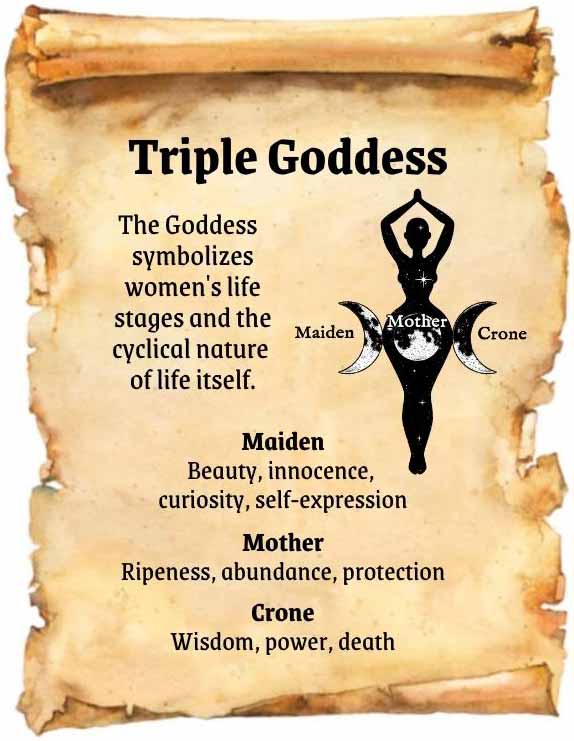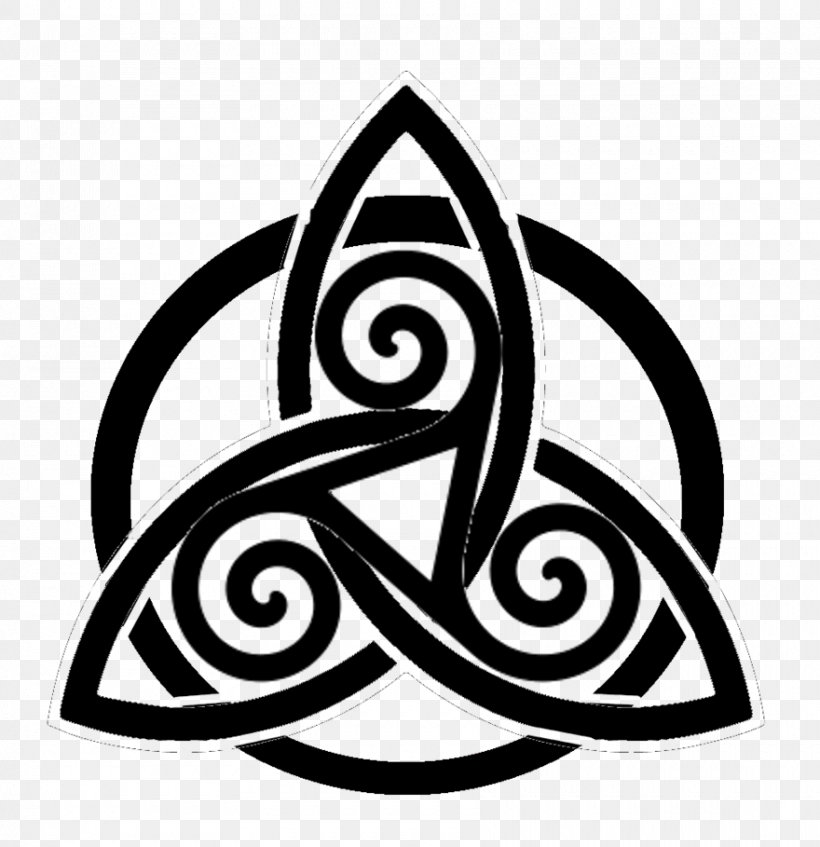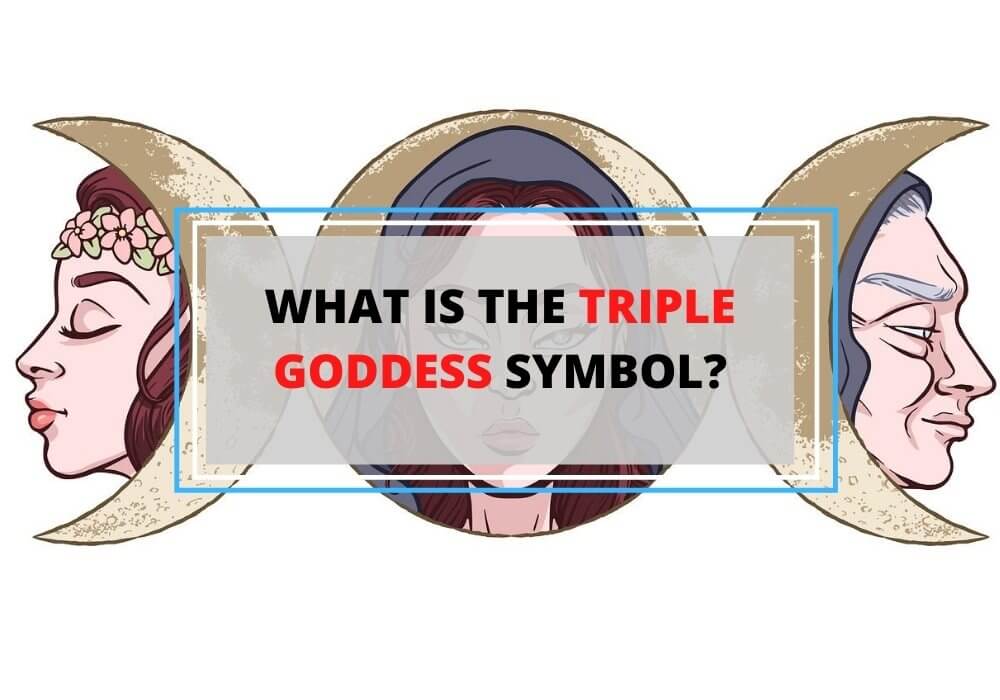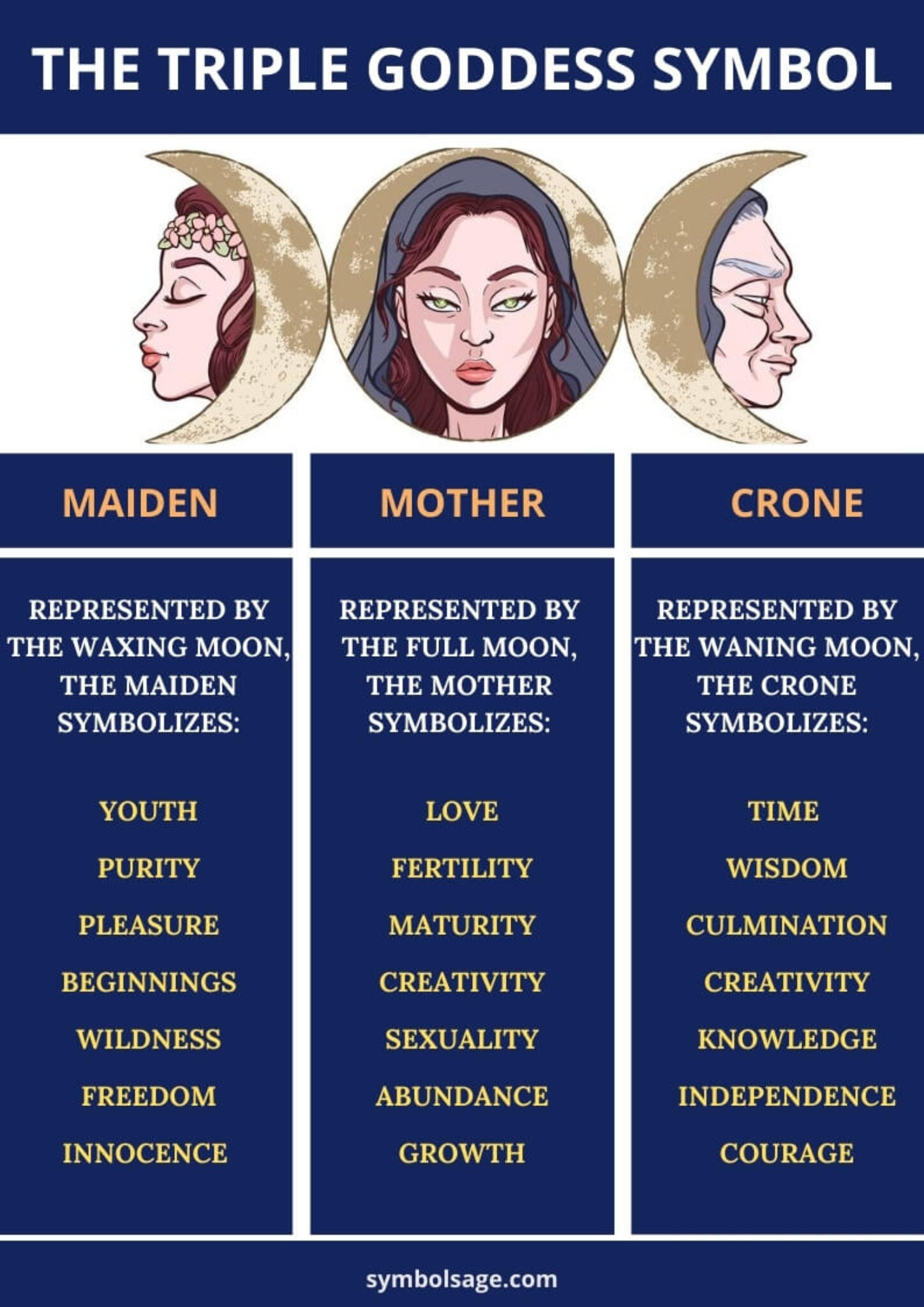Triple Goddess Symbol Ornament Mounted Print by k9printart in 2021

Triple Goddess Symbol Goddess symbol, Triple goddess symbol, Triple
The Triple Goddess symbol, representing the Maiden, Mother, and Crone, is one of the most ancient symbols known to humanity. Discovered on artifacts worldwide, it dates back to 10,000 B.C.E. While its form may differ across cultures, its meaning remains largely consistent. Long before the rise of Christianity, Judaism, and Islam, goddess.

The Triple Goddess Symbol Wicca Wonder Pinterest
The Triple Goddess Symbol The Maiden The Maiden aspect aligns with the crescent-to-waxing phase of the Moon, and represents the youthful phase of a woman's life. This is the time of growth, reflected by the waxing of the Moon as it moves toward fullness. In the cycles of Nature, the Maiden is associated with dawn, sunrise, and the Spring season.

File Triple Goddess Symbol Triple Moon Clipart Full Size Clipart
The Triple Goddess symbol, a compelling icon in various spiritual and cultural contexts, stands as a testament to the timeless fascination with the divine feminine. This symbol, often depicted as.

Triple Goddess Symbol Ornament Mounted Print by k9printart in 2021
The most common meaning assigned to the Triple Goddess symbol is the maiden, mother, and crone. Each phase of the moon correlates with a phase of a woman's life. Here's a breakdown of each phase. The Maiden: Represented by the new moon. The maiden embodies purity, youth, creation, pleasure, naivety, and new beginnings.

1000+ images about Pagan Triple Goddess on Pinterest Triple goddess
The Triple Goddess stands as an enduring symbol of feminine strength and empowerment. Her three aspects—Maiden, Mother, and Crone—reflect the complexity and depth of the feminine experience. In a world that increasingly recognizes the importance of gender equality and empowerment, the Triple Goddess inspires women and men alike to embrace.

The Triple Goddess Symbol & Meaning of the Maiden, Mother, Crone Spells8
This powerful symbol, found in various forms across cultures, encapsulates the phases of a woman's life and the cyclical nature of existence. Join me on a journey as we delve into the enigmatic realm of the Triple Goddess, unraveling the threads that connect her to our collective human experience. The Triple Goddess Across Cultures:

Triple Goddess Symbol Triquetra Wicca Celtic Knot, PNG, 880x909px
You've likely seen the Triple Goddess symbol associated with Wicca: But did you know that the concept of a triple goddess can be traced back to a number of ancient civilizations throughout the world? In this article, we will explore who exactly is this mysterious figure, the Triune Goddess: Maiden, Mother and Crone. Who is the Triple Goddess?

Triple Goddess Symbol Stock Illustration Download Image Now iStock
The Triple Goddess is a deity or deity archetype revered in many Neopagan religious and spiritual traditions. In common Neopagan usage, the Triple Goddess is viewed as a triunity of three distinct aspects or figures united in one being.

Triple Goddess Symbol What Does It Really Mean?
The Triple Goddess symbolized these cycles, with the maiden representing youth and new beginnings, the mother representing fertility and nurturing, and the crone representing wisdom and the end of life. The Triple Goddess was often depicted in cave paintings and figurines, emphasizing the importance of these archetypes in the lives of early humans.

Triple goddess moon symbol wiccan symbol Vector Image
The Tridevi is the trinity of goddess consorts for the gods in the Trimurti, typically personified by the Hindu goddesses Saraswati, Lakshmi, and Parvati. In Shaktism, these triune goddesses are considered the manifestations of Mahadevi, the Supreme Goddess (the female abolute), also known as Mula-Prakriti or Adi Parashakti. Antiquity

Triple Goddess symbols Goddess Symbols, Goddess Art, Celtic Mythology
The Triple Moon symbol combines the waxing, full, and waning moons to represent the phases of womanhood, the cycles of life, and the Triple Goddess. The waxing moon represents birth and youth, the full moon represents life and stability, and the waning moon represents wisdom and death.

The Meanings & Origins of the Triple Goddess Symbol Zenned Out
Each metaphor powers the other. Triple Goddess Signet Ring by Blessed Be Magick. As you may have gathered from the shapes, this symbol is comprised of the three phases of the moon - waxing, full, and waning. These shapes don't just refer to the life cycle of the moon, they represent the life cycle of woman - maiden, mother, and crone.

The Triple Goddess Moon goddess art, Moon art, Goddess art
The Triple Goddess is a significant symbol and deity archetype, with roots in ancient cultures across the globe. More recently, neopagan traditions including Paganism, Wicca, and Neopaganism have begun to exploring expressions of triple goddesses, embracing the beauty and simplicity of the symbol. This powerful symbol comprises a waxing.

he Triple Goddess Exploring Its Meaning, Roots and Significance
Some people attribute it to the Triple Goddess facet. This symbol could also evoke "past, present and future", "body, mind and soul", or "land, sea and sky." This last explanation is the most common version of Celtic culture. Although this is a misinterpretation, neo-pagans use the Triquetra as a symbol of protection against evil.

Triple Goddess (Neopaganism) Wikipedia
What is the Triple Goddess Symbol? The triple moon symbol, also called the triple goddess symbol, is represented by two crescent moons flanking a full moon. The left side of the symbol features a waxing moon, the center features a full moon, while the right side depicts a waning moon.

Triple Moon Symbol/Triple Goddess Symbol Meaning And Origins Explained
triquetra ( treye--truh; from the Latin adjective triquetrus "three-cornered") is a triangular figure composed of three interlaced arcs, or (equivalently) three overlapping vesicae piscis lens shapes. It is used as an ornamental design in architecture, and in medieval manuscript illumination (particularly in the Insular tradition ).